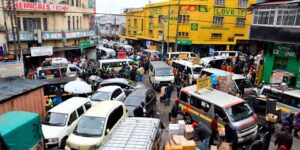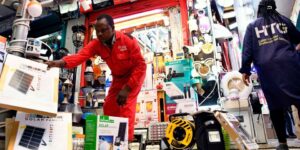A first-time customer at the New Madina Restaurant in the Xiaobei Lu area of China’s bustling Guangzhou City might sometimes have to pinch himself to confirm that he has not landed at an eatery in the bustling backstreets of Nairobi CBD’s ‘Little Murang’a’.
In some seasons, the predominant tongue heard will be Kikuyu from dozens of traders on package tours descending on a major source of goods for Kenya’s retail markets. The restaurant is a popular meeting place for Kenyans and other African visitors not inclined to Cantonese cuisine. The familiar dishes of chicken curries, beef or mutton stews, served with rice or chapati, are dished out in humongous portions at very fair prices.
The New Madina, run by a Chinese Muslim family, is located in the Deng Feng complex, which hosts a hotel, several retail outlets and dozens of cargo companies specialised in shipping goods to Kenya and other East African countries, Nigeria, Mali, Senegal and the rest of West Africa.
After a hearty meal at New Madina, the traders might make their way to a cacophony of electronic shops in the Dashatou area, some 10 minutes’ drive. Asked about the latest smart televisions on offer, a shop attendant will, in a high-pitched, rapid-fire tone, reel off a host of familiar Japanese, South Korean and emerging Chinese brands: “Sony, Samsung, Panasonic, Hitachi, Haier, Toshiba, Hisense, You say …” “Say what?”
“You say”.
The accompanying guide will gently explain that ‘You Say’ is not a specific brand, but an invitation for the customer to name the brand he wants. The appropriate label will then be affixed on any of the ‘nameless’ television sets on display. The traders will make their purchases, often in bulk, through a highly efficient logistics system. Kenyan cargo companies with branches in Guangzhou and other major Chinese trading hubs will pick up the goods, pack them securely and ensure delivery by ship or air.
The trader picks up the goods at warehouses in Nairobi’s Eastleigh area or has them delivered directly to his own distribution or retail outlet.
Kenyan Somalis
The shipping companies, mostly owned by Kenyan Somalis with operations in China, Dubai, Turkey and anywhere else where Kenyan traders frequent, operate with legendary efficiency, trust and honesty. Incidents of goods lost, misdirected or tampered with are almost unheard of. In most instances, no payment is required until the merchandise has been delivered.
The logistical magic extends to dealing with customs. The cargo reaches the consignee exactly as packed, not having been opened by the Customs and Excise authorities for tax assessment. On delivery, the customer only pays the cost of shipping, with no receipts given for import duties, or documents for quality and standards inspections.

Welcome to the Nyamakima economy. This vibrant trading hub in downtown Nairobi, sandwiched between the lower extremities of River Road and Kirinyaga Road, has become the stuff of legend for a bustling grey economy that is in many ways now used to define the Mt Kenya entrepreneurial spirit. It played its role in loosening President Uhuru Kenyatta’s grip on the Mt Kenya vote, and by extension securing President-elect William Ruto’s victory over opposition leader Raila Odinga.
It was the government crackdown on smuggling, beginning in 2017, that Deputy President Ruto’s propaganda machinery deployed with devastating effect to brand President Kenyatta an enemy of the Kikuyu business community. Ruto’s Hustler vs Dynasty narrative and Bottom-Up economic policy resonated with small-scale traders and artisans, who bore the brunt of an economic meltdown. Ruto’s camp blamed it on the President, despite the reality of factors such as the Covid 19 pandemic, skyrocketing international oil prices and the Russian invasion of Ukraine that were beyond his control. The straw that broke the camel’s back, says Micro-Small Medium Enterprise Alliance CEO Sammy Karanja, was an event in August 2018, when President Kenyatta witnessed a bonfire of seized illicit goods worth over Sh1.5 billion.
The President at the time vowed to push on with action he said was aimed at protecting Kenyan industry and consumers, and warned against anyone politicising the crackdown, but he fell squarely into a narrative already being spun by Ruto and his Mt Kenya allies.
Mobile lending App
The Deputy President took to assailing the president for condemning ordinary Kenyans to Fuliza, which could have been taken as a general reference to any usurious mobile-lending App. It is now emerging that pointing the finger at the specific product linked to the Kenyatta family’s NCBA bank running on the Safaricom platform was very deliberate and indicative of business wars in the offing. Still, a big question arises why the government crackdown on smuggling and tax evasion was reduced to a Kikuyu issue.
The majority of custom at New Madina restaurant explains it. According to Karanja, the overwhelming number of Kenyan traders who make the trips to China, Dubai and Turkey are from Mt Kenya. That is a simple fact dating back to the period in the early 2000s when traders from the region made their first excursions to China, saw the opportunities and began inviting their relatives and friends, leading to the evolution of the organised package tours.

The Nyamakima area now hosts hundreds of retail shops selling electronics, bathroom and kitchen fittings, lighting fixtures, carpets, generators, automobile spare parts, shoes, mobile phones and accessories, and almost everything else.
The area, now extended beyond the original Nyamakima matatu stage to all the adjoining streets, is also the distribution point for goods that fan out across the rest of Kenya.
The cheap trinkets sold by hawkers in Nairobi traffic or in bars and markets across the city come from Nyamakima. So do a lot of quality products in outlets at high-end shopping malls. This brings out another point. Not all the goods coming via Nyamakima are cheap, counterfeit or sub-standard. In China, you get what you pay for. One can get the highest quality and genuine European and American brand names, and also, at very competitive prices, Chinese products of similar quality.
Tax evasion
One can also get the very obvious fakes of the ‘You Say’ label, or the ones that carry a label that approximates the original; Sumsang, for instance, instead of Samsung. Of course, there are still issues around tax evasion and quality. According to Karanja, his association is not pushing for the right to avoid taxes or bring in counterfeits but only for predictability and common sense in enforcement. He points out that, even where importers do not pay import duties directly to the Kenya Revenue Authority, the taxes are covered under the shipping charges paid to the cargo agents.
Rather than tax items individually based on their value, KRA charges a flat minimum fee based on volume. The problem, he says, is when the taxman arbitrarily increases the rate from Sh1.3 million to Sh2.2 million per 20-foot container as he says happened last year.
Or when a trader clears his goods at Sh1 million and just the following week another trader with a similar consignment is charged Sh1.8 million.
These are the issues, he says, that the association raised with Ruto at three meetings and received a sympathetic ear.
He now hopes that once he assumes the presidency, Ruto will act on constraints to business and allow small and medium enterprises to thrive. He envisions the informal sector progressively being regulated so that it evolves from underground activity to a rightful place in the economic environment. However, many in the grey economy might not share his vision.
They would rather remain away from the clutches of the tax officials, the Kenya Bureau of Standards, the County inspector or any other authority. These are the ones who will have to learn in due course that the installation of President Ruto’s ‘Hustler Nation’ government will not be a license for smuggling and tax evasion. Campaign rhetoric is one thing, governance quite another.
Credit: Source link